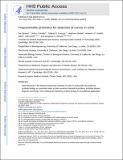Programmable probiotics for detection of cancer in urine
Author(s)
Danino, Tal; Prindle, Arthur; Kwong, Gabriel A.; Skalak, Matthew T.; Li, Howard; Hasty, Jeff; Allen, Kaitlin N.; Bhatia, Sangeeta N; ... Show more Show less
DownloadBhatia_Programmable probiotics.pdf (2.305Mb)
PUBLISHER_POLICY
Publisher Policy
Article is made available in accordance with the publisher's policy and may be subject to US copyright law. Please refer to the publisher's site for terms of use.
Terms of use
Metadata
Show full item recordAbstract
Rapid advances in the forward engineering of genetic circuitry in living cells has positioned synthetic biology as a potential means to solve numerous biomedical problems, including disease diagnosis and therapy. One challenge in exploiting synthetic biology for translational applications is to engineer microbes that are well tolerated by patients and seamlessly integrate with existing clinical methods. We use the safe and widely used probiotic Escherichia coli Nissle 1917 to develop an orally administered diagnostic that can noninvasively indicate the presence of liver metastasis by producing easily detectable signals in urine. Our microbial diagnostic generated a high-contrast urine signal through selective expansion in liver metastases (10[superscript 6]-fold enrichment) and high expression of a lacZ reporter maintained by engineering a stable plasmid system. The lacZ reporter cleaves a substrate to produce a small molecule that can be detected in urine. E. coli Nissle 1917 robustly colonized tumor tissue in rodent models of liver metastasis after oral delivery but did not colonize healthy organs or fibrotic liver tissue. We saw no deleterious health effects on the mice for more than 12 months after oral delivery. Our results demonstrate that probiotics can be programmed to safely and selectively deliver synthetic gene circuits to diseased tissue microenvironments in vivo.
Date issued
2015-05Department
Massachusetts Institute of Technology. Institute for Medical Engineering & Science; Harvard University--MIT Division of Health Sciences and Technology; Massachusetts Institute of Technology. Department of Electrical Engineering and Computer Science; Koch Institute for Integrative Cancer Research at MITJournal
Science Translational Medicine
Publisher
American Association for the Advancement of Science (AAAS)
Citation
Danino, T., A. Prindle, G. A. Kwong, M. Skalak, H. Li, K. Allen, J. Hasty, and S. N. Bhatia. “Programmable Probiotics for Detection of Cancer in Urine.” Science Translational Medicine 7, no. 289 (May 27, 2015): 289ra84–289ra84.
Version: Author's final manuscript
ISSN
1946-6234
1946-6242